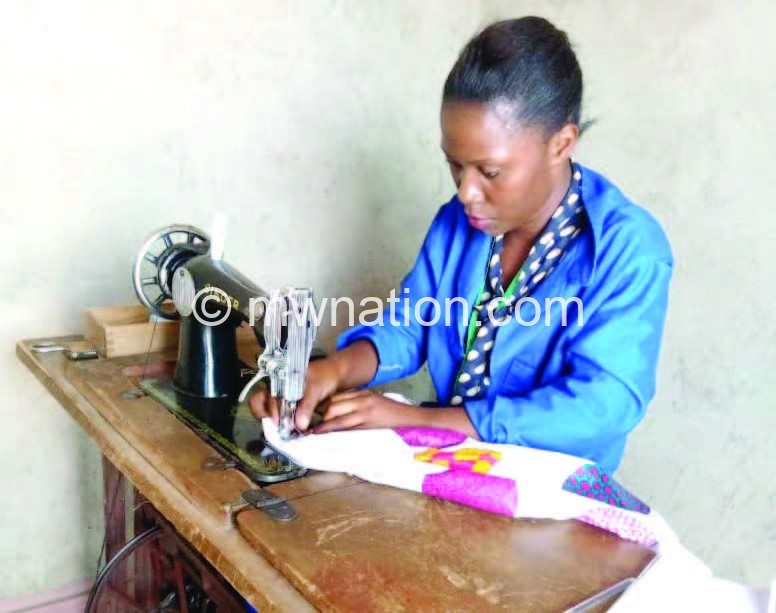Life-changing K200 000
Wearing a blue work suit at 8am, Mphatso, 25, drops off a bicycle-taxi she uses every day when going to her office.
It is a tailoring shop located within Mangochi Bus Depot, but she prefers to call it “my office”. This is how proud she is of her newly found job.

The mother of two has lived as a shoe vendor for some time after dropping out of a technical school where she had registered for a tailoring, fashion and design course.
Says Mphatso: “I could not sit for my exams because I could not manage the K40 000 examination fees.”
Without a proper income, yet with a responsibility to fend for her two children as well as provide support to her ageing parents who are her immediate neighbours, she says she was under pressure to find a trust-worthy business to survive.
Mphatso says she could buy a pair of second-hand shoes and sell it a higher price and use the profits for her needs. This, she confesses, was a hard way of earning a living.
Luckily for her, an opportunity came knocking at her door when she saw an advert from the Centre for the Development of People (Cedep) calling for young women to apply for soft loans.
Mphatso took the challenge.
She says: “Fortunately, I was successful and my business plan passed the test and I qualified for the K200 000. I was so happy.
“With that money, I bought two sewing machines and I am renting this space for K35 000 a month. I will pay back this loan in 10 months’ time.”
Mphatso sees the loan as a “huge opportunity and a life-changer”.
She says even with Covid-19, the two months she has been operating the business has made her believe she made the right choice.
Just after a month after setting up the tailoring business, Mphatso recruited a male colleague who helps her with sewing.
“I know with this loan I will grow my business and probably qualify for a bigger loan. My dream is not just to go back to school and upgrade myself but also establish a tailoring school to benefit fellow youths here in Mangochi,” adds the young mother whose hope for the future beats her worries of a squandered past.
She is not just the type who prides in self-pity.
The Cedep loan which Mphatso received is from a pilot programme targeting marginalised women which the institution is implementing with funding from COC Netherlands.
Out of the applications that were received, eight women, including Mphatso, qualified for the loan which has a two percent interest and works as a revolving fund.
Cedep senior programmes manager Rodney Chalera says those that qualified pitched convincing business plans.
“The targeted women are those that dropped out of school or lack formal employment due to other reasons. The loan is meant to empower them economically. From the business plans we have approved there is hope that this soft loan will change lives,” he says.
Another beneficiary Deborah Chimkwanda, 24, used the loan to start a bicycle-taxi business (kabaza).
She has currently bought two bicycles and gets about K700 per bike every day.
Deborah, who come from Mangochi too, used part of the funds to buy maize which she intends to sell in February to earn more money that will propel her business.
She says: “My plan is to run a restaurant. However, with the loan amount, I could not start it. I have just invested the money so that I can start the business of my dream.
“I will sell the maize when the demand is higher and make more money. I plan to run a restaurant alongside kabaza.”
Deborah says she has a deal with the people who help her run the bicycle-taxi business which will also see them getting empowered.
“I told them that if I get K150 000 from any of the bicycles, I will donate that bicycle to the operator and this is my contribution to alleviating the poverty among our community,” she says.
Other beneficiaries of the K200 000 soft loan, spread across the country, are running salons while others are into selling clothes.
Chalera says depending on the success of the pilot phase, Cedep may provide more loans to women and probably men in future for economic empowerment.





